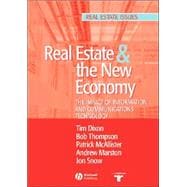
Note: Supplemental materials are not guaranteed with Rental or Used book purchases.
Purchase Benefits
What is included with this book?
Tim Dixon is Director of the Oxford Institute of Sustainable Development and Professor of Real Estate in the Department of Real Estate and Construction at Oxford Brookes University. With more than 25 years' experience of research, education and professional practice in the built environment he is a qualified fellow of the RICS and of the Higher Education Academy, a member of SEEDA's South East Excellence Advisory Board, as well as the editorial boards of five leading international real estate journals. He has worked on funded collaborative research projects with UK and overseas academics and practitioners and his personal research interests revolve around the sustainability agenda and its impact on property development, investment and occupation, and the impact of ICT on commercial property and real estate markets. The research is based on a strong interdisciplinary approach which incorporates policy and practice impacts, and futures thinking. He is also a member of the CORENET Sustainability Working Group, and a member of the Steering Group for the 'Future of Cities' Research programme, based in the James Martin 21st Century School at Oxford University. In 2009 he was awarded Honorary Fellow status of the Institute of Green Professionals.
| The Authors | xi | ||||
| Foreword | xiii | ||||
|
|||||
| Preface | xv | ||||
|
xviii | ||||
|
1 | (40) | |||
|
1 | (1) | |||
|
2 | (1) | |||
|
3 | (2) | |||
|
5 | (27) | |||
|
32 | (1) | |||
|
33 | (2) | |||
|
35 | (2) | |||
|
37 | (1) | |||
|
38 | (3) | |||
|
41 | (156) | |||
|
43 | (41) | |||
|
43 | (1) | |||
|
44 | (6) | |||
|
50 | (6) | |||
|
56 | (2) | |||
|
58 | (8) | |||
|
66 | (3) | |||
|
69 | (11) | |||
|
80 | (1) | |||
|
81 | (3) | |||
|
84 | (44) | |||
|
84 | (1) | |||
|
84 | (3) | |||
|
87 | (20) | |||
|
107 | (14) | |||
|
121 | (4) | |||
|
125 | (1) | |||
|
125 | (3) | |||
|
128 | (32) | |||
|
128 | (1) | |||
|
128 | (3) | |||
|
131 | (4) | |||
|
135 | (4) | |||
|
139 | (3) | |||
|
142 | (1) | |||
|
143 | (2) | |||
|
145 | (1) | |||
|
146 | (1) | |||
|
146 | (1) | |||
|
146 | (1) | |||
|
147 | (1) | |||
|
148 | (10) | |||
|
158 | (1) | |||
|
158 | (2) | |||
|
160 | (37) | |||
|
160 | (1) | |||
|
161 | (4) | |||
|
165 | (13) | |||
|
178 | (16) | |||
|
194 | (1) | |||
|
195 | (2) | |||
|
197 | (132) | |||
|
199 | (27) | |||
|
199 | (2) | |||
|
201 | (3) | |||
|
204 | (2) | |||
|
206 | (3) | |||
|
209 | (4) | |||
|
213 | (11) | |||
|
224 | (1) | |||
|
225 | (1) | |||
|
226 | (53) | |||
|
226 | (1) | |||
|
226 | (9) | |||
|
235 | (15) | |||
|
250 | (7) | |||
|
257 | (8) | |||
|
265 | (10) | |||
|
275 | (1) | |||
|
275 | (4) | |||
|
279 | (50) | |||
|
279 | (2) | |||
|
281 | (7) | |||
|
288 | (13) | |||
|
301 | (12) | |||
|
313 | (5) | |||
|
318 | (9) | |||
|
327 | (1) | |||
|
327 | (2) | |||
|
329 | (43) | |||
|
331 | (41) | |||
|
331 | (1) | |||
|
332 | (10) | |||
|
342 | (7) | |||
|
349 | (2) | |||
|
351 | (7) | |||
|
358 | (8) | |||
|
366 | (2) | |||
|
368 | (4) | |||
| References | 372 | (40) | |||
| Index | 412 |
The New copy of this book will include any supplemental materials advertised. Please check the title of the book to determine if it should include any access cards, study guides, lab manuals, CDs, etc.
The Used, Rental and eBook copies of this book are not guaranteed to include any supplemental materials. Typically, only the book itself is included. This is true even if the title states it includes any access cards, study guides, lab manuals, CDs, etc.